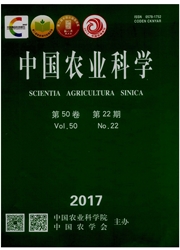

 中文摘要:
中文摘要:
[目的]山羊草与硬粒小麦杂交培育的人工合成小麦已广泛应用于国内外小麦品种改良,研究人工合成小麦与普通小麦杂交后代的籽粒硬度变异类型,有助于提高育种效率.[方法]以来自CIMMYT的176份人工合成小麦与普通小麦杂交后代为材料,采用单籽粒谷物硬度测试仪、特异引物的PCR扩增和改进的SDS-PAGE凝胶电泳对其SKCS硬度及其基因型进行了研究.[结果]硬质基因型均为Pina-Dlb/Pinb-Dla类型,软质基因型有Pina-Dla/Pinb-Dla、Pina-Dlj/Pinb-Dli、Pina-Dla/Pinb-Dli和Pina-Dlc/Pinb-Dlh等4种类型.其中Pina-Dlj/Pinb-Dli是最常见的突变类型,占软质麦总数的49.1%.不同puroindoline类型的硬度比较表明,Pina-Dlb/Pinb-Dla与其它类型间差异均达1%显著水平.在软质基因型中,Pina-Dlc/Pinb-Dlh和Pina-Dla/Pinb-Dli类型硬度相对较高,与Pina-Dlj/Pinb-Dli和Pina-Dla/Pinb-Dla的籽粒硬度差异达5%显著水平.另外,Pina-Dla/pinb-Dli的千粒重和粒径也显著高于其它变异类型.[结论]本试验发现了多种普通小麦中未曾发现过的puroindoline基因型,且硬度数值间存在显著差异,为人工合成小麦在品种改良中的应用和我国从CIMMYT引种提供了依据,同时也有助于puroindoline基因的多态性研究.
 英文摘要:
英文摘要:
[Objective] Synthetic wheat, obtained by crossing Aegilops tauschii with Triticum turgitum, contains genetic variability not found in hexaploid wheat. Now they have been widely used for genetic improvment of common wheat. [Method] A total of 176 CIMMYT lines derived from synthetic hexaploid wheats × Triticum aestivum crosses were used to measure SKCS hardness and detect puroindoline alleles by Single Kernel Characterization System (SKCS), specific-primers PCR amplification and modified SDS-PAGE. [Result]All of the surveyed hard wheats were Pina-Dlb/Pinb-Dla. Pina-Dlj/Pinb-Dli, Pina-Dlc/Pinb-Dlh, Pina-Dla-Pinb-Dli, and Pina-Dla/Pinb-Dla were present in soft types, and Pina-Dlj/Pinb-Dli was the most common one with a percentage of 49.1%. Kernel hardness of Pina-Dlb/Pinb-Dla type was significantly higher than that of other types. Kernel hardness of Pina-Dlc/Pinb-Dlh and Pina-Dla/Pinb-Dli were significantly higher than that of lines with Pina-Dlj/Pinb-Dli and Pina-Dla/Pinb-Dla. In addition, kernel diameter and thousand kernel weight in the genotype with Pina-Dla/Pinb-Dli allele was the highest among the five allele types. [Conclusion]It is concluded that three kinds of puroindoline alleles absent in common wheat are found in surveyed synthetic wheats and it have significant difference in SKCS hardness index between Pina-Dlc/Pinb-Dlh and Pina-Dlj/Pinb-Dli. The study would provide useful information for improving common wheat and introducing cultivars from CIMMYT, and facilitating the analysis of puroindoline sequence polymorphism.
 同期刊论文项目
同期刊论文项目
 同项目期刊论文
同项目期刊论文
 期刊信息
期刊信息
